Why Higher Protein is Key for Fat Loss (backed by science)
Why Higher Protein Is Key for Fat Loss (Backed by Science)
When it comes to losing fat, the conversation often centers around cutting carbs or calories. But one of the most powerful — and often overlooked — strategies for sustainable fat loss is increasing your protein intake.
If your goal is to lose fat (not just weight), preserve muscle, and feel full and energized, protein should be your go-to macronutrient.
The Role of Protein in Fat Loss
Protein is essential for many functions in the body, but when you're working toward fat loss, it plays a few standout roles:
1. Preserves Lean Muscle Mass
When you're in a calorie deficit, your body not only pulls energy from stored fat — it can also break down muscle tissue. That’s a problem, because muscle is metabolically active, meaning it burns more calories at rest.
A 2020 study published in The Journal of Obesity (PubMed link) found that participants who followed a higher-protein, energy-restricted diet preserved significantly more lean mass while losing body fat — compared to those on a standard-protein diet.
Takeaway: More protein = more muscle preserved = more fat burned.
2. Increases Satiety and Reduces Cravings
Protein is the most satiating macronutrient, meaning it helps you feel full longer. This can naturally lead to consuming fewer calories without feeling restricted or constantly hungry — two major wins for sustainable fat loss.
If you often find yourself snacking late at night or craving sweets, increasing your protein intake earlier in the day can make a big difference.
3. Boosts Metabolism Through the Thermic Effect of Food
Digestion requires energy. Of the three macronutrients (protein, carbs, fat), protein has the highest thermic effect — meaning your body burns more calories digesting it.
Protein TEF: ~20–30%
Carbs TEF: ~5–10%
Fat TEF: ~0–3%
So, when you eat 100 calories of protein, your body might burn up to 30 calories just digesting it. Over time, this can contribute to a slight but meaningful boost in metabolic rate.
4. Supports Hormonal Balance and Recovery
Protein plays a crucial role in the production of hormones and enzymes, especially during periods of weight loss. For women, this is even more important, as hormonal imbalances can affect everything from energy to fat storage to mood.
Increased protein helps support hormonal health while also aiding recovery from exercise — making it easier to stay active and consistent.
How Much Protein Should You Eat for Fat Loss?
While individual needs vary, most research supports aiming for 1.2 to 2.0 grams of protein per kilogram of body weight during fat loss phases. For active women, a simple starting point is:
🧮 0.8 to 1 gram of protein per pound of body weight
For a 150 lb woman, that’s around 120–150g of protein per day.
Simple Ways to Boost Your Protein Intake
✅ Add eggs or Greek yogurt to breakfast
✅ Choose lean proteins like chicken, turkey, fish, or tofu
✅ Snack on edamame, cottage cheese, or a protein bar
✅ Use protein powder in smoothies, oats, or baked goods
✅ Prioritize a protein source at every meal
The Bottom Line
If your goal is fat loss, prioritizing protein is one of the smartest things you can do. Not only does it help maintain your metabolism and muscle mass, but it also keeps you fuller longer, reduces cravings, and supports recovery — all while helping you look and feel stronger.
Don’t fear protein — make it your fat loss MVP. 💪
Need Help Personalizing Your Macros?
As a functional nutritionist, I help women like you build sustainable plans that work with your body — not against it. If you're ready for more energy, better results, and real support, learn more about 1:1 nutrition coaching.
